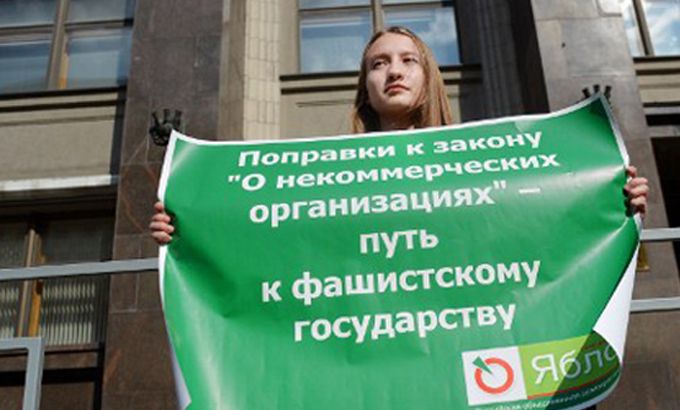Russia house backs bill to tag NGOs as agents
Lower house gives initial backing to bill forcing internationally-funded groups to carry a “foreign agent” tag.

The Russian lower house of parliament has given initial backing to a contentious bill forcing internationally-funded non-governmental organisations to carry a “foreign agent” tag.
Friday’s speedy crucial first reading of a bill sponsored by the ruling United Russia party comes after Vladimir Putin, the country’s president, accused opposition activists demonstrating against his 12-year rule of being in the payroll of the US Department of State.
The measure was supported by 323 State Duma deputies in the first of three required readings, while four voted against it and one abstained.
Of the four political parties represented in the Duma, only the populist A Just Russia said it did not support the measure.
Under the wide-ranging bill, all Russian NGOs funded from abroad and ruled to be involved in politics, or acting in the minterests of foreign states and other international donors, will have to carry a “foreign agent” tag and submit to more rigorous checks by the authorities.
A breach of the law would be punishable by hefty fines or jail terms.
‘Openness towards society’
Russian officials say the bill is aimed at preventing foreign states from influencing Russia’s domestic politics and emulates US legislation on foreign-funded NGOs.
Critics say it is part of a broad crackdown on the opposition that followed unprecedented winter protests against Putin as well as a throwback to Stalin’s time, when nearly everyone deemed to be in contact with foreign nationals was branded a spy and a foreign agent.
Irina Yarovaya, one of the bill’s authors, said the measure would not hinder the work of NGOs involved in charity work as opposed to politics.
“Its purpose is the openness towards society, towards citizens,” she said in the Duma.
Ilya Ponomaryov, a lawmaker with A Just Russia, said the legislation would further polarise Russian society.
“Today you are deepening a split in society,” he told lawmakers in a fiery speech, a white ribbon, the symbol of the nascent protest movement, pinned to his lapel.
Al Jazeera’s Jonah Hull, reporting from Moscow, said many NGOs fear the proposed law could greatly hinder their efforts in the nation.
“The definition is so broad under the new law that it includes anything merely trying to influence or change public opinion”, our correspondent said.
Further, any organisation seen to be a “foreign agent” would then be constitutionally barred from accepting foreign funds, the stigma attached to such a label, says our correspondent, would make it difficult for the organisations to then turn to Russian financiers.
‘The deaf with the blind’
The bill comes on the heels of another controversial law that sharply raised fines for opposition protesters and was rushed through parliament last month despite pleas from rights activists.
The label “foreign agent” in Russian does not necessarily implicate the individual or organisation in espionage but does have a negative connotation, implying they are acting in the interests of a foreign power.
Tatyana Morshchakova, one of the authors of the Russian Constitution, said that if the law was passed and enacted, the ministry of justice would be able to shut down scores of NGOs if they refused to comply.
“The law is exceptionally discriminatory,” she told a news conference earlier Friday.
“Its main public consequence is that the activities of NGOs would no doubt be wound down. The dialogue between authorities and society is a dialogue of the deaf with the blind.”
Mikhail Fedotov, the head of the Kremlin’s council on human rights, said he had written to Duma speaker Sergei Naryshkin asking him to throw out the bill and conduct public hearings instead.
“We believe this law contradicts the Russian Constitution (and) comes into conflict with the Civil Code,” he told reporters before the vote.
Critics say the Russian bill is modelled after an outdated piece of US legislation.
The Foreign Agents Registration Act (FARA) was enacted in the United States in 1938 to guard against Nazi Germany’s propaganda ahead of World War II.
In the run-up to parliamentary elections in December, Putin lashed out at Western attempts to “influence the course of the election campaign” through Russian NGOs, warning this was “money thrown to the wind”.
The second and the third readings of the law are expected next week.